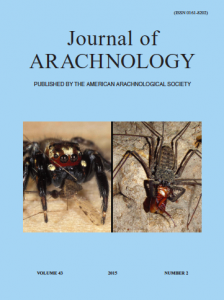 The authors of a 2015 paper about non-native spider populations in Chile are retracting it from the Journal of Arachnology because they copied the introduction of a 2011 paper verbatim.
The authors of a 2015 paper about non-native spider populations in Chile are retracting it from the Journal of Arachnology because they copied the introduction of a 2011 paper verbatim.
The retraction was triggered by the first author, who “insisted on a full retraction in lieu of milder remedies,” according to the journal’s editor-in-chief.
The paper, “Alien spiders in Chile: evaluating Darwin’s naturalization hypothesis,” tested Darwin’s hypothesis that introduced species that are phylogenetically distant from native animals are more likely to thrive. It was published in April. Authors Andrés Taucare-Ríos and Ramiro O. Bustamante are both based at the University of Chile in Santiago.
The notice reads:
Our article concerning Darwin’s naturalization hypothesis in the context of alien spiders in Chile (Taucare-Rios & Bustamante 2015) was inspired by Escobedo et al. (2011), the first study that tested DNH (Darwin’s naturalization hypothesis) in Chile. In the preparation of our paper we copied verbatim part of the introduction of Escobedo et al. (2011), and as a consequence we now retract our article. We apologize both for the copying and for not mentioning the important contribution of Escobedo et al. (2011) to our article and to the investigation of biological invasion in Chile.
Robert Suter, the journal’s editor-in-chief and a former professor at Vassar College, said that first author Taucare-Ríos was adamant in his request to pull the paper.
I know very little beyond what’s in the retraction, the text for which was written by the lead author and mildly edited by me. The retraction was initiated by the lead author who insisted on a full retraction in lieu of milder remedies.
Suter also said that this is a first for him, and may be a first for the journal.
This is the first retraction I’ve dealt with, and to my knowledge the first ever for the Journal of Arachnology, so it’s new territory for both me and the journal.
Taucare-Ríos said that he didn’t have anything to add to the notice.
The reasons for our retraction are mentioned in the same redemption, I think there is no more to add. It was a mistake and we wanted to amend this situation with the retract.
The paper has not yet been cited, according to Thomson Scientific’s Web of Knowledge.
Hat tip: Rolf Degen
Like Retraction Watch? Consider supporting our growth. You can also follow us on Twitter, like us on Facebook, add us to your RSS reader, and sign up on our homepage for an email every time there’s a new post. Click here to review our Comments Policy.
I’m sorry, but that’s just utterly silly. An introduction is an overview over the current state of the subject leading up to the study and results at hand. It is the one part where duplication has no downside at all. Retacting a whole, possibly valuable study just because of this formality is pure sillyness.
Although I would not characterize these types of retractions as ‘pure silliness’ (see also http://www.nature.com/news/2009/090730/full/news.2009.753.html), I agree that retracting an otherwise good paper is not in anyone’s best interests. The case does raise the following question for me: If the copyright to the work has already been transferred to the publisher (and I don’t know whether such is the case with the Journal of Arachnology), isn’t the editor/publisher responsible for determining the best outcome (e.g., correction vs. retraction) of the case? Why give in to the author’s unreasonable demand?